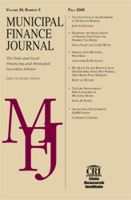Complete Issue
Author: W. Bartley Hildreth.
Source: Volume 37, Number 04, Winter 2017 , pp.1-88(88)

< previous article |return to table of contents
Abstract:
Municipal analysts held their meeting in the seat of negative credits—the state of Illinois, the city of Chicago, and Chicago Public Schools. These governmental debt issuers face difficult political decisions in the use of their economic and fiscal wealth to solve long-delayed budget problems. It is fitting that the first panel addresses the ability of public leaders to honor the financial obligations to bondholders while providing the necessary public services. Credit analyst Peter Stettler moderates a panel composed of local experts, including Laurence Msall, of the prominent Civic Federation; radio reporter Kate Grossman; and newspaper columnist Greg Hinz. After reviewing the state’s fiscal crisis and budget impasse, Msall highlights the cascading effect on Illinois local governments. Hinz then focuses on local pension politics while Grossman zeros in on the social service impact, with particular attention to primary, secondary, and higher education. We have long known that ability to pay is much easier to assess than is the willingness to pay. The second panel in this issue of MFJ explores what to do with elected officials who have not, will not, or cannot resolve a fiscal situation. Management consultant Marti Kopacz moderates a panel consisting of law professor Melissa B. Jacoby; attorney and former mayor of Providence, Rhode Island, Angel Taveras; and bankruptcy judge Frank J. Bailey. Professor Jacoby reviews Chapter 9 bankruptcy provisions and the way they actually work, with particular focus on the Detroit blueprint, which she followed in real time. Former mayor Taveras discusses a city bankruptcy filing from an elected official’s perspective. Judge Bailey, speaking from his perspective presiding over the Central Falls, Rhode Island, bankruptcy case, points out that Chapter 9 is not just a way to cut debt but rather a way to find a way forward for the public entity involved. A mainstay of the NFMA conference is the Industry Roundtable, which allows key market participants to engage in a wide-ranging discussion of issues facing the municipal market. Moderated by NFMA chair Lisa Washburn are representatives from the regulators and the main industry groups. Representing regulators are Jessica Kane, director of the Office of Municipal Securities at the Securities and Exchange Commission, and Ritta McLaughlin, chief education officer of the Municipal Securities Rulemaking Board. Industry leaders include Michael Decker, of the Securities Industry and Financial Markets Association; Bill Daly, of the National Association of Bond Lawyers; and J. Ben Watkins, an issuer official and the representative of the Government Finance Officers Association. This year’s roundtable opens with each representative outlining his or her group’s market priorities. Questions and interactions then focus on the SEC’s Municipal Continuing Disclosure Cooperation initiative, impediments to better issuer disclosures, and the need, if any, for modifying SEC Rule 15c2-12. An efficient market reflects all relevant information. If news can move markets, then political jurisdictions are especially vulnerable to media headlines resulting from the public’s right to know about internal debates, public discussions, partisan differences, and fiscal plans and facts. Headlines are also made by market “experts” and other events that can influence markets. A panel on headline risk is moderated by municipal analyst Natalie Cohen and includes book author and columnist Joe Mysak; tax-exempt asset strategist Sean Carney; and municipal strategist Michael Zezas. The panelists discuss several headlines from the past decade and speculate on upcoming ones both locally and nationally that could affect markets. Carney notes that headline risk is partly due to the municipal market “transitioning from a rates market to a credit market” with the demise of bond insurance. Zezas offers compelling market comparisons around certain headlines. The panel offers useful insights into the need to separate headline risk from substance risk, but according to theory, any relevant information can move the market.Keywords: NFMA 33rd Annual Conference
Affiliations:
1: Georgia State University.